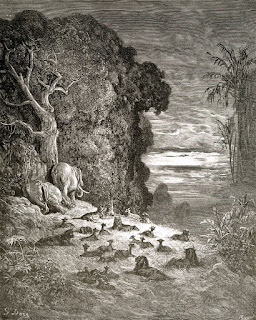For the Life of the World
St. John 6:41-51
In "The Pain of Animals: A Problem in Theology," C.S. Lewis points out that Satan rebelled before mankind, and that his work might be seen in the widespread "distortion" of God's created order, noting that "(in particular) the insect world appears to be Hell itself visibly in operation around us."
Our conversations about redemption are rightly focused on our own story: God became man and gave himself up for us. But it is good to call to mind that there is more to this story. All of creation is marred by the cosmic war in which we find ourselves. Nature itself is deeply scored and does not escape the consequences of the Devil's fall from grace.
Christ addresses this in today's Gospel: "The bread that I will give is my flesh for the life of the world." Our fate is bound up in the fate of the cosmos, this dust and ash, these stars and clouds, because God first fashioned us from clay, and then Himself became "the bread which comes down from Heaven." He entered into the cosmos for the life of the cosmos by means of our redemption.
St Paul expresses this fact wonderfully in Romans: "For the creation waits with eager longing for the revealing of the sons of God...because the creation itself will be set free from its bondage to decay and obtain the glorious liberty of the children of God. We know that the whole creation has been groaning in travail together until now; and not only the creation, but we ourselves, who have the first fruits of the Spirit, groan inwardly as we wait for adoption as sons and the redemption of our bodies!" (Rom. 8:18-23, RSV)
All of Creation is holding its breath until the glory of God is revealed in us at the Resurrection. From the Incarnation to the final Judgment is only the labor which will give birth to these children. The Prophet Isaiah writes concerning the Great Day that "Behold, I create new Heavens and a new Earth; and the former things shall not be remembered or come into mind. But be glad and rejoice in that which I create; for behold I create Jerusalem a rejoicing, and her people a joy." (Isa. 65:17-18, RSV)
How magnificent! How overwhelming. In the blink of an eye all creation will be made again, and ourselves first of all, when "this mortal puts on immortality, and this corruptible puts on incorruptibility"! As Christ says in our Gospel that whoever comes and eats, "I will raise him up on the Last Day." And nature itself will be loosed from its bonds, and live freely on account of this Bread, the very flesh of God, the ground of all being.
St. John the Revelator takes up where Isaiah leaves off, "Behold, the dwelling of God is with men...and death shall be no more, neither shall there be mourning nor crying nor pain any more, for the former things have passed away...Behold, I make all things new!" (Rev. 21: 3-5, RSV)
In "The Pain of Animals: A Problem in Theology," C.S. Lewis points out that Satan rebelled before mankind, and that his work might be seen in the widespread "distortion" of God's created order, noting that "(in particular) the insect world appears to be Hell itself visibly in operation around us."
 |
| Gustave Dore, "The Evening of the Seventh Day" illustration for Paradise Lost |
Christ addresses this in today's Gospel: "The bread that I will give is my flesh for the life of the world." Our fate is bound up in the fate of the cosmos, this dust and ash, these stars and clouds, because God first fashioned us from clay, and then Himself became "the bread which comes down from Heaven." He entered into the cosmos for the life of the cosmos by means of our redemption.
St Paul expresses this fact wonderfully in Romans: "For the creation waits with eager longing for the revealing of the sons of God...because the creation itself will be set free from its bondage to decay and obtain the glorious liberty of the children of God. We know that the whole creation has been groaning in travail together until now; and not only the creation, but we ourselves, who have the first fruits of the Spirit, groan inwardly as we wait for adoption as sons and the redemption of our bodies!" (Rom. 8:18-23, RSV)
All of Creation is holding its breath until the glory of God is revealed in us at the Resurrection. From the Incarnation to the final Judgment is only the labor which will give birth to these children. The Prophet Isaiah writes concerning the Great Day that "Behold, I create new Heavens and a new Earth; and the former things shall not be remembered or come into mind. But be glad and rejoice in that which I create; for behold I create Jerusalem a rejoicing, and her people a joy." (Isa. 65:17-18, RSV)
How magnificent! How overwhelming. In the blink of an eye all creation will be made again, and ourselves first of all, when "this mortal puts on immortality, and this corruptible puts on incorruptibility"! As Christ says in our Gospel that whoever comes and eats, "I will raise him up on the Last Day." And nature itself will be loosed from its bonds, and live freely on account of this Bread, the very flesh of God, the ground of all being.
 |
| Fra Angelico, Predella of the San Domenico Altarpiece (1424) |
St. John the Revelator takes up where Isaiah leaves off, "Behold, the dwelling of God is with men...and death shall be no more, neither shall there be mourning nor crying nor pain any more, for the former things have passed away...Behold, I make all things new!" (Rev. 21: 3-5, RSV)



Comments
Post a Comment